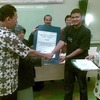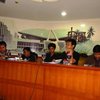Address: Jl. Duren Tiga Selatan No. 68 A
Jakarta Selatan
Phone/Fax: 62 21 7972034
Email : seknas_fitra@yahoo.com
Website: www.seknasfitra.org
SEKNAS FITRA (Indonesia Transparency Budget Forum) focuses on budget as an essential tool to safeguard and guarantee the public good. It was formed in September 1999 as an autonomous, non-profit organization, to promote good governance and to support the right of the public to be involved in budget processing from budget arrangement to its evaluation. It seeks to become the foundation for discourse and budget transparency activities in Indonesia.
Since 2000, FITRA has performed activities that concern state budget analysis and citizens’ participation in Jakarta as well as Banten, Depok, Solo, Maluku, Papua, Kupang and other regions in Indonesia. With guidance from a National Board and Secretary, the FITRA networks were created to coordinate and oversee these regional concerns. Because the national budget is supposed to cater to the needs of the people, FITRA engages citizens to promote accountability and transparency in the use of the state budget. Supported by Kemitraan, they called for greater budget allocation to health and education while the DRSP-USAID gives them support in their transparency and accountability budget programs and advocacies. Other recent projects include the following:
- The nationwide Development Program on Budget Transparency, made possible with funding support in 2000 – 2007 from the Ford Foundation;
- The Gender Budget Program, which aimed to make budget processing and implementation more gender-responsive in the areas of Polmas Sulawesi Barat regent, Palu (Sulawesi Tengah) and Timur Tengah Selatan (Nusa Tenggara Timur), was supported by The Asia Foundation (TAF); and
- The Pro Poor Budgeting in NTB (Lombok Barat, Lombok Tengah and Lombok Timur regent), an advocacy to eradicate poverty, also funded by the TAF; and
- The publication of “Invasion for Region Budget Democratization” and “Module of Budget Advocacy Based on Islam Organization” as well as quarterly
newsletters and yearend budget reports. These aim to strengthen further social monitoring of national budget through greater social consciousness.



